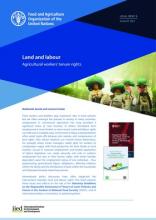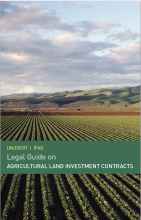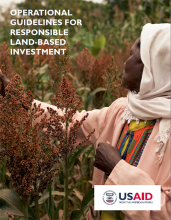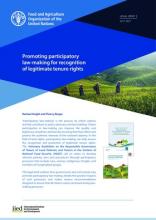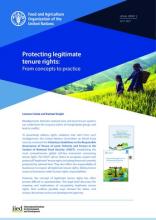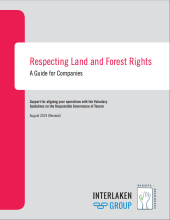Resources for Due diligence
Land and labour
Land and labour rights can intersect in multiple ways. Investments in large-scale plantations often entail trade-offs between job creation and compressions of land rights. Also, labour relations can involve tenure dimensions, for example where estate managers sublet plots for workers to complement wages with food production for their family or local markets.
Casual or seasonal employment and limited application of labour legislation can create precarity not only in workers’ employment but also in their tenure rights, with entire families dependent upon the employment status of one individual – thus perpetuating generational labour obligations, affecting relations within the family and the distribution of tasks within the household, and disproportionately impacting women. International policy discourses have often neglected these intersections.
Legal Guide on Agricultural Land Investment Contracts
Investment in agriculture is essential for sustainable development, in particular for achieving food security, adequate nutrition, decent employment, poverty reduction and environmental protection. In seeking to attract agricultural investment, many governments and local communities have entered into Agricultural Land Investment Contracts (ALIC). Mindful of the contractual challenges involved and considering the importance of enhancing knowledge of the legal regime applicable to agricultural land investment operations, the International Institute for the Unification of Private Law (UNIDROIT) in collaboration with the International Fund for Agricultural Development (IFAD) have prepared this UNIDROIT/IFAD Legal Guide on Agricultural Land Investment Contracts (ALIC Legal Guide).
OECD Due Diligence Guidance for Meaningful Stakeholder Engagement in the Extractive Sector
This guide provides a practical framework for identifying and managing risks with regard to stakeholder engagement activities to ensure companies play a role in avoiding and addressing adverse impacts as defined in the OECD Guidelines for Multinational Enterprises. The guidance also includes an assessment framework for industry to evaluate their stakeholder engagement performance and targeted guidance for specific stakeholder groups such as indigenous peoples, women, workers and artisanal and small scale miners.
Operational Guidelines for Responsible Land-Based Investment
This guide discusses USAID’s recommendations for best practices related to the due diligence and structuring of land-based investments, with the goal of reducing risks and facilitating responsible projects that benefit both the private sector and local communities. It is designed to help companies identify practical steps to align their policies and actions with international policy consensus on land governance and land rights.
Promoting participatory law-making for recognition of legitimate tenure rights
"Participatory law-making” is the process by which citizens actively contribute to policy advocacy and law-drafting. Citizen participation in law-making can improve the quality and legitimacy of policies and laws by ensuring that they reflect and protect the authentic interests of the national citizenry. In the field of land rights, participatory law-making can help ensure the recognition and protection of legitimate tenure rights. The Voluntary Guidelines on the Responsible Governance of Tenure of Land Fisheries and Forests in the Context of National Food Security (VGGT) call on states to develop relevant policies, laws and procedures through participatory processes that include men, women, Indigenous Peoples and members of marginalized groups.
Protecting legitimate tenure rights: From concepts to practice
Respecting Land and Forest Rights - A Guide for Companies
This Guide provides an entry point to understanding and implementing the principles of responsible governance of land tenure set out in the VGGT for companies involved in land-based investment. It provides a more manageable presentation of the VGGT, along with steps to ensure that a company acts consistently with them and includes thorough due diligence on the tenure rights of project-affected communities.
Respecting Land and Forest Rights: Risks, Opportunities and a Guide for Companies
This Guide is complementary to the Interlaken Group's 'Respecting Land and Forest Rights: a Guide for Companies'. It provides guidance on what companies can do to reduce risk through improve tenure governance in land-based investment, reflecting the principles of responsible governance of land tenure set out in the VGGT. It provides a more manageable presentation of the VGGT, along with steps to ensure that a company acts consistently with them and includes thorough due diligence on the tenure rights of project-affected communities.
Respecting the human rights of communities: a business guide for commercial wind and solar project deployment
This guide provides companies involved in wind and solar projects with information and strategies to identify, prevent, mitigate, and account for adverse human rights impacts that they cause, contribute to, or are directly linked to through their operations, products, or services, by virtue of their business relationships. It may also be useful for investors, business partners, government actors, civil society organizations, communities, and other stakeholders. It comes with a Legal Risk Primer.
Respecting the human rights of communities: a legal risk primer for commercial wind and solar project deployment
This legal risk primer provides the general counsels and corporate legal teams of commercial wind and solar companies with an overview of the key legal risks that may arise from the above community-related human rights impacts. It is a companion to CCSI's business guide on the same topic.


